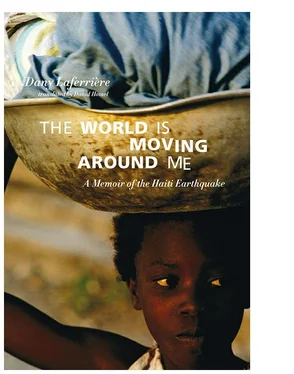It
We have no idea what to expect in the coming years. People, like houses, can be divided into three categories: the ones who are dead, those who are gravely injured, and those who are deeply damaged inside but don’t know it yet. The latter are the most troubling. The body will keep going for a while before it finally falls to pieces. Suddenly. Without warning. Those people have hidden the screams inside them. One day they will implode. Until then, they seem in perfect health. A mixture of bonhomie and high energy. Happy to exist since their brush with death. They’ve been able to put a distance between themselves and the images that haunt them. Sometimes they talk about it with a joyful glow in their eyes. How do they do it? That’s the point — they’re not doing it. You can’t have experienced it and go your way as if nothing had happened. It’ll catch up to you one day. Why do you say “it”? Because “it” doesn’t have a name yet.
The Lost Friend
I met Filo at the end of the 1970s. Was it at the theater school that took over the large rooms at the Lycée des Jeunes Filles after classes were over? Or was it at the Sylvio Cator Stadium where we went to see the finals between the Racing Club and the Black Eagles or Le Violette? Filo has always been in my life. We were part of the little group of starving kids who mixed up art and revolution. Radio Haïti-Inter was recruiting new journalists. Filo went to try out. At the beginning, it didn’t work; he was too much a rebel to follow the station’s strict rules. He had no notion of time. He would get to his show a half-hour late. In the end, his bosses figured it out: they stuck him at the very end of the day’s programming. He could show up when he wanted and do what he felt like. His audience was made up of insomniacs, and he helped them get through the night. The very next day, Filo was a star. His mocking irony and sharp eye — he was a young man from a rough neighborhood — attracted all levels of society right from the start. President Jean-Claude “Baby Doc” Duvalier imprisoned then exiled most of the country’s influential journalists in November of 1980, muzzling what was called at the time “the independent press.” They all returned when Baby Doc went into exile himself in February of 1986. There was dissension within the group of alternative journalists, which meant that some were left on the outside. Filo wandered in the wilderness of Port-au-Prince for a while. When I asked after him, every time I came through town, often no one knew where he was. I was told he was doing odd jobs, an elegant way of saying that he wasn’t part of the tribe anymore. The last time I saw him was at the Hôtel Kinam in 2008; he’d come to interview me for his show on Télé-Ginen. Filo was in a class by himself. The others in the group didn’t seem to have progressed much, but he’d made changes in his head. Of course he still talked about religion, which scared the Haitian left, but he was as sharp-minded as ever. And subtle enough not to impose his beliefs on other people. That day he gave me a present: an image of the Black Virgin of Poland that believers in voodoo take for the Polish version of the goddess Erzulie. I still have it. With his traditional dress and his peasant hat, Filo looked like he’d never left the 1970s, a time marked by the furious search for authenticity among intellectuals. Despite his choice of clothes, he was one of the liveliest minds in the country. When I came back for this trip, I met up with him at the beginning of the month in front of the Rex Theatre, and we set a date for January 12. I went to the radio station in Delmas. We started the interview more than an hour late. Filo gave the false impression of being interested only in popular culture, whereas he knew plenty about a lot of things. I knew his little mannerisms, like that sideways smile that let you know he was nobody’s fool. At first, he insisted on taking me back to the hotel, but he had to meet a group of American businessmen who might invest in the station. If I waited for him, I’d probably be late; I had to leave right away to be back for my five o’clock meeting. Finally Filo agreed. I got to the Hôtel Karibe just in time to meet Saint-Éloi, who was coming in from Montreal with his two suitcases stuffed with books and an urgent need to take a shower. Instead, I dragged him to the hotel restaurant where we ordered lobster and fish in sea salt, just before all Port-au-Prince began to shake.
A Short Film
I’m spending so much time on the moments that preceded the explosion because it’s impossible to recreate the event itself. It lives within us in too intimate a fashion. No distance is possible with those kinds of emotions. The moment is eternally present. We remember the very instant before in the slightest detail. A short film where people are laughing, crying, talking, fighting, kissing, getting upset because the other guy is late, eating, begging, saying hello, setting a meeting for tomorrow or later in the evening, swearing to the other person that you won’t lie to them any more, or steal or kill or torture or make promises you have no intention of keeping, consoling someone who just lost a loved one, lying on a hospital deathbed, playing soccer, coming to Port-au-Prince for the first time or leaving the country (an airplane has just taken off). All these small acts bind us together and weave the great cloth of humanity. At 4:53 in the afternoon, our memory trembled.
A Green Jeep
A horn sounds three times. The green Jeep that was following pulls up next to us. What’s going on? Arms reach out of the open doors like branches of a leafless tree. They tell us they’ve been driving around town, saying hello to the living. We turn right. My mother lives at Delmas 31.
At Frankétienne’s Place
We wander in circles through this labyrinth of alleyways; most of them turn into dead ends. Finally, we get onto a street that slopes up toward Frankétienne’s place. The massive red wall that made his house look like a small fortress is badly damaged. A twisted electric pole blocks the entrance. Wires hang along the gate. A neighbor tells us he’s there. I look up. There’s a gaping hole in the wall. His library is devastated. We push open the gate, careful not to touch the wires on the ground. There’s no sense getting electrocuted after surviving an earthquake. He hears our voices and comes out. I’ve never seen him so upset. Red as a boiled lobster. No theatrics this time: he is naked in his pain. He hugs us and won’t let go. His wife appears, as discreet as ever, in his shadow. Her smile is sadder than usual. Frankétienne tells us his version of the event. He carries the city inside him. He turns toward his gutted house, overwhelmed. He heard a locomotive noise like most people, then decreed it was “the sound of all that Port-au-Prince contains breaking up.” A poet talking. The cloud he first thought was a great fire turned out to be “the dust of my city.” The city and his body are one. We avoid looking at each other. The cry of a bird in the noonday sky. Frankétienne watches it fly toward the bare mountains that surround Port-au-Prince, then he takes up his story again. He was on the terrace with a South American journalist when it happened. Since he’s in symbiosis with the elements, he immediately understood it was an earthquake. With the journalist on his heels, he rushed down the stairs, grabbed his wife in the kitchen, and ran into the courtyard. He was out of breath by the end of his story. Though he’s often caught in the web of banal details of daily life, finally he had an event equal to his gargantuan appetites. Only one place was spared: the garden where we often met to discuss Tolstoy, Joyce, or God (Frankétienne doesn’t bother with small fry). We stood a moment in silence, and then Frankétienne, as if suddenly remembering we were there, urged us to view the damage. Paintings on the floor. The broad walls covered in frescoes were shattered. His house is an art gallery devoted to his work. His books were scattered everywhere. He’s both artist and businessman — a Renaissance man. The last time I visited, he brought me to his little warehouse where he keeps hundreds of paintings. He told me to choose one. I can’t bring myself to ask him about the state of his warehouse. And now, with all necessary gestures, he launches into a description of how he was rehearsing a play about the earthquake a half-hour before it struck. Standing in the garden, he begins declaiming. We stand back to give him space for his theater. He speaks of a Port-au-Prince “that is torn, that is crevassed.” Frankétienne replays the earthquake with his words. His prophetic one-man show. Marie-Andrée keeps watch so he doesn’t get overwrought. Suddenly, he calms down. We gather around him. He isn’t the indefatigable man he used to be. And sometimes he forgets that fact. I’ve known him a long time, and I’ve never seen him so affected. He is not mourning his own fate, but the fate of the city he’s never wanted to leave. He realizes he’ll never be able to put on this play “that stinks of fear.” We tell him the opposite is true: his play is part of all this. Port-au-Prince has to absorb the earthquake so it won’t swallow us up. Instead of fleeing, we have to confront “the thing,” as they’re calling it in the poorer districts. We have to name it if we intend to digest it. Frankétienne should leave his lair. People need to see him. Like the young man who, as I hesitated at the gate, called from the other side of the street, “He’s there. The poet is home.”
Читать дальше












